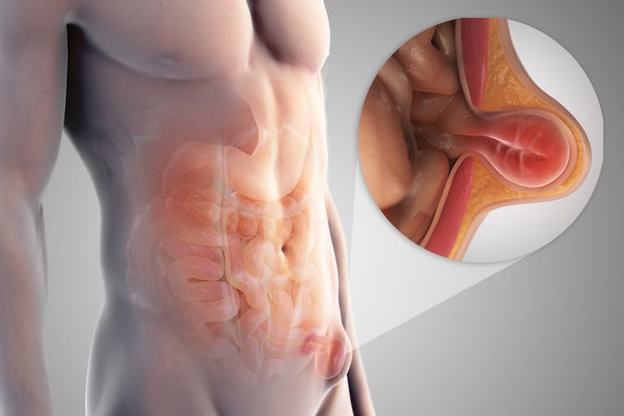
Inguinal Hernia
Abdominal wall hernias occur when a part of an internal organ (typically the small intestine) breaks through a tear or weak point in the abdominal wall. Inguinal hernias are most common in men, with a 25% risk of an occurrence over a male’s lifetime. Women only have a 3% risk.
Signs and Symptoms
- A lump or bulge on one or both sides of the groin that is apparent when standing and can sometimes disappear when lying down. For males, they can sometimes experience a swollen and/or painful scrotum.
- Pain or discomfort during physical exertion, straining or lifting.
- Weakness or pressure in the groin.
Incarcerated and Strangulated Inguinal Hernias
The term incarcerated hernia refers to an inguinal hernia in which the small intestine cannot be massaged back into a normal position within the abdomen, and remains extended through the abdominal wall in the lower abdomen, groin or scrotum. This can lead to a strangulated hernia, in which the blood supply is cut off to the incarcerated small intestine. This condition can result in tissue death and requires immediate medical attention.
Symptoms can include:
- Pain and redness in the area of the incarcerated hernia that can sometimes worsen in a short period of time.
- Fever
- Accelerated heart rate
When to Seek Treatment for an Inguinal Hernia
Inguinal hernias are a serious medical condition and result in serious complications, cause pain, limit activities and impact your quality of life. It’s important to seek an evaluation by a general surgeon to discuss treatment options.
New Surgical Advances
Today, many inguinal hernias can be treated with minimally invasive procedures that reduce your recovery time and reduce your chance of surgical complications or infections.
At Hennepin Healthcare, we now utilize a robotic device, the da Vinci System, for many of these procedures. Utilization of the da Vinci provides unique advantages to you, including:
- Smaller incisions than a typical open surgical procedure
- Most often, less time in the hospital
- Faster recovery due to the smaller incision size
- Reduced risk of infection
Appointments to discuss your condition and possible treatments can be made by calling 612-873-6963.


